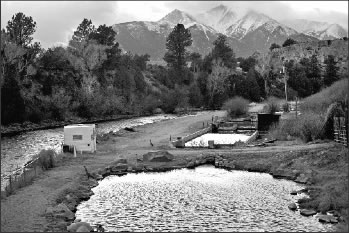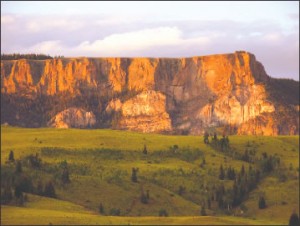By John Orr
Nestlé Waters’ Chaffee County project update
Most Colorado Central readers already know about Nestlé Waters North America’s plans to export water out of the Arkansas River Basin — from springs they’ve purchased near Nathrop — to their bottling plant in Denver. Nestlé plans to restore the area around the springs (Bighorn Spring and Hagen Spring), drill a couple of supply wells in the shallow aquifer, build two pump houses and pipe the water five miles to a new loading station along U.S. 285 near Johnson Village.
The day after Nestlé Waters’ presentation to the Collegiate Peaks Anglers in January they received an e-mail from B.B. – the author was not identified on the Nestlé website – saying, “… I was glad to see a good turnout from the Buena Vista public. You presented the facts very well and therefore, I did not hear any true opposition to your project.”

Well, things have changed. Opposition to the project – heretofore unorganized – became a lot more focused early in March. A meeting attended by about 40 individuals concerned with various parts of the project was held on March 11 to discuss and develop “options and tactics they might use to try and block,” the project, according to a report from Lee Hart published on the Salida Citizen website.
She acknowledges that the group is late to the party.
Nestlé’s application for county permits for the project is underway. In fact, the Chaffee County Planning Board unanimously recommended approval of a conditional use permit to develop the water supply on March 11. As we went to press the county commissioners plan to discuss the special use permit on March 18 leaving the opponents and their attorney, Jay Hake, a week to develop their strategy. The county commissioners also plan to discuss Nestlé’s 1041 permit application (mitigation of construction effects, transportation, etc.) on March 31.
It’s not clear if there is any legal basis for stopping the project. Nestlé has purchased the land where the springs are located and has met all permit requirements so far. They are actively pursuing augmentation water to protect senior rights holders downstream. They’re currently in negotiations for a ten-year lease from Aurora.
Colorado Central spoke with Michele Riggio by telephone about the project. She is a local physical therapist who is, “interested in health, interested in sustainability.” She knows getting the Chaffee County Commissioners to deny Nestlé’s permits is a long shot. She is urging opponents to write letters to Aurora hoping that the lease will fall through. She is also proposing an education process to convince sellers to deny any future purchase of agricultural water to Nestlé.
She laments the late start developing organized opposition saying, “It seems that people have just been waiting for someone to step forward.” Riggio believes that the group of opponents may not be successful this time around but that the grassroots organization could help stop the next water grab in the county if they choose to stay involved.
UPDATE II: Chaffee County Commissioners have decided to extend the comment period on the Nestlé project and plan to hold another hearing on April 21, after a public hearing in Salida on March 19 drew a capacity crowd to the Salida SteamPlant theater. The Commissioners hope to host the April meeting in Buena Vista.
Pipeline from Bailey to Conifer (and back)
Conifer Water, LLC has had a pipeline in the works for a couple of years now. The managing partner, John McMichael, told the Fairplay Flume recently that his company plans a pipeline from the North Fork of the South Platte River near Bailey to the Conifer area along U.S. 285. They plan to recycle effluent from wastewater treatment facilities back to the river about 100 yards downstream from the intake so that the volumes taken and returned are equal.
Most homeowners in the area rely on groundwater for supplies. Well policies developed in the 1950s were based on estimates of 4,000 to 6,000 wells in that part of Jefferson County by the year 2000. Instead there are now 35,000 wells in the area — some with high levels of radionuclides.
According to McMichael funding is nearly complete and will be with the issue of industrial revenue bonds. He is looking at reorganizing Conifer Water into a special district to allow it to issue tax-exempt bonds after the company starts turning dirt on the project to avoid delaying the start-up.
The proposed route runs from the Bailey water treatment facility at the bottom of Crow Hill to the Conifer Market Place shopping center on the southwest side of Conifer.
San Luis Valley groundwater news
Judge O. John Kuenhold issued his ruling on the management rules for the Valley’s first groundwater sub-district on Wednesday February 18. The long awaited decision didn’t please everyone and the judge remanded the rules back to the sub-district’s board of managers to work out protection and compensation details for senior rights holders. Much of the plan was accepted, according to the Valley Courier, including: the administrative record; fee structure; data collection conducted in the unconfined aquifer storage; boundaries of the sub-district; and composition of the board of managers.
Meanwhile, State Engineer Dick Wolfe has completed the list for his advisory committee on groundwater irrigation in the valley. The committee is charged with generating bottom-up solutions for pumping that will protect senior rights holders, lead to a sustainable aquifer and satisfy Colorado’s responsibilities under the Rio Grande Compact.
Deputy State Engineer Michael Sullivan said that the makeup of the committee represents a large constituency. Their goal is to incorporate as many different groups as is workable.
Short takes
• The Pueblo Board of Water Works approved a bid for the Columbine Ditch from ski resort developer Ginn Development. Aurora entered a bid and may still end up with the water under a first right of refusal they negotiated contractually with the board.
• Conejos County State Representative Ed Vigil’s HB09-1233 was passed by the state house and sent to the state senate in March. The bill would authorize Acequia Ditch Corporations in Conejos, Costilla, Huerfano and Las Animas. Acequias manage water as a community for the common good. The bill would recognize irrigation methods that were in place before Colorado became a state. State Senator Gail Schwartz will carry the bill in the state senate.
• The Bureau of Reclamation turned 160 years old on March 3.
• Colorado hay farmer Gary Hausler was down in the San Luis Valley for the February Rio Grande Roundtable trying to drum up support for a pipeline from the Mississippi River to Colorado’s eastern plains. He hopes to avoid more agricultural dry ups in the state. For once someone has a project for the Front Range that isn’t a transbasin diversion.
• It looks like sewer rates will double over the next three years for Alamosa residents.
• Gunnison County Commissioner Jim Starr recently testified before congress on changes to the General Mining Act of 1872. His testimony centered around keeping “water quantity and quality as high as we can,” according to a report from the Crested Butte News.




